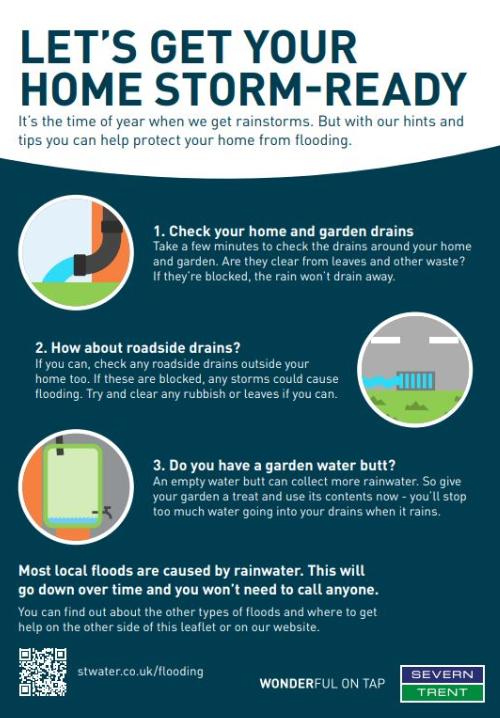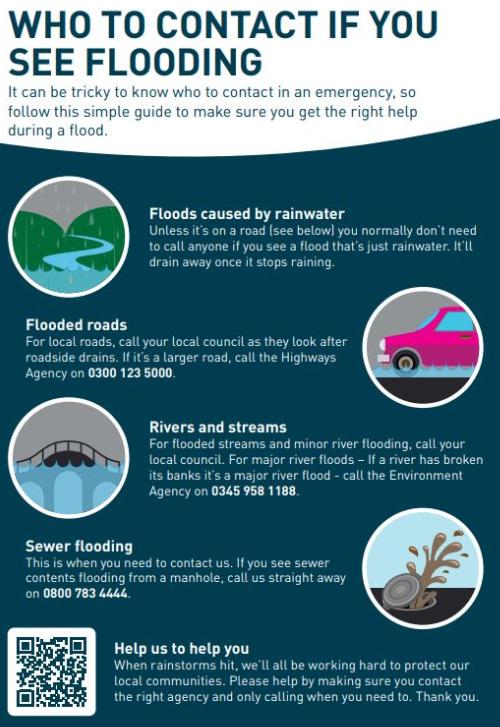Flooding can happen when heavy rain occurs or when rain occurs over several days. The rivers rise and can over top their banks – this may not occur instantaneously as the rivers are also affected by rain further upstream, coming down (called peaks).
Flooding also occur when heavy rain falls on surfaces like roads and fields more quickly than the time it takes for it to drain away – this is called surface water flooding.
Preparing for a flood:
Whilst it's not possible to remove all risk of flooding, there are some actions that you can take to help protect your property and those who live there:
- Know the risk:
- Make a flood plan:
- Be prepared – the Environment Agency's guide details how to prepare for a flood (www.gov.uk/prepare-for-flooding/protect-your-property), including:
- Making sure you know how to turn off your water, gas and electricity supply
- Checking your household building or contents insurance covers flooding – FloodRe may be able to help if you need support:floodre.co.uk/find-an-insurer
- Preparing a flood kit in case you need to leave your home
- Check your home is ready:
- Check your home and garden drains - are there leaves or other waste trapped in there? This could stop rainwater from draining away, so make sure you pull anything out.
- Check your flood protection equipment – ensure that any flood defences are working properly and ready for use.
- Check the drains on your road are clear. If there are any problems, please report it to Warwickshire County Council Highways Flood drainage.
- Drain your water butt – before wet weather comes, make space in your water butt by using water in the garden or to wash the car. Creating more room will help prevent too much rain getting into the sewers at once.
Who to contact during a flood:
It's not always simple to know who to contact in an emergency, but by saving this information, you'll be able to access the support that you need, when you need it:
- Emergencies: If there is risk of serious illness, injury or risk to life, call 999.
- Flooding in the road: If you see flooding in local roads, report it to Warwickshire County Council Highways Team 01926 412515. For major roads, contact the Highways Agency on 0300 123 5000.
- Major river flooding (breaking banks): For help, contact the Environment Agency flood hotline on 0345 988 1188.
- Smaller river or stream flooding: Report it to Warwickshire County Council Highways Team 01926 412515.
- Sewer flooding: If you see sewer debris in flood water, like toilet paper or poo, get in touch with us straight away on 0800 783 4444.
Useful contacts:
- For general advice, call the Environment Agency's 24-hour flood hotline on 0345 988 1188.
- The National Flood Forum has a helpline that provides general support before, during and after a flood, including home resilience and insurance. Contact the charity on 01299 403 055.
Driving:
Do not drive through floodwater. Just a few inches of water is enough to float your car and damage your engine. Most deaths caused by flooding, happen when people are trapped in their car.
A lot of properties are damaged unnecessarily when people drive through floodwater, creating large bow waves. Avoid driving through flood water.
If you experience flood water on highways please contact Warwickshire Highways
How to report a flood:
If you are in a dangerous or life threatening situation, call the emergency services on 999.
Flooding on the roads, highways, public drains and gullies – report to Warwickshire County Council Highways 01926 412515
Flooding on major trunk roads and motorways – report to Highways England 0300 123 5000.
Call the Environment Agency Floodline number on: 0345 988 1188 if you see flooding from:
- collapsed or badly damaged river banks;
- flooding from main rivers;
- main rivers blocked by a vehicle or fallen tree causing risk of flooding;
- unusual changes in river flow
Call Severn Trent Water on 0800 783 4444 if you see flooding from sewers and burst water mains.


What to do after a flood:
Continue to check the local news for updates.
If your property was flooded:
- Take photographs of any damage if it is safe to do so - to provide to your insurance company
If you switched off your electricity:
- Get your electric meter checked by the electricity transmission company
- Get your fuse box and electrical sockets checked by an electrician
- Drinking tap water should be fine but if it looks an unusual colour or has a strange odour or tastes strangely or if you have concerns look at the advice on the Severn Trent website or contact Severn Trent.
- If in doubt boil water first or use bottled water.
- Before you use gas appliances get a Gas Safe Engineer to check to ensure they are safe.
- Be aware of the health effects caused by a flood. When cleaning up, wear appropriate clothing and protection as flood water can be contaminated with harmful bacteria. Advice can be found here.
- Be mindful of how the stress and traumatic feelings of personal loss, can have an impact on your own and the mental wellbeing of others.
National Government advice on what to do after a flood.